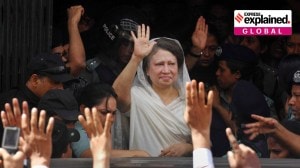Till divorce do us part8230;
Marital life is blissful so long as there are no problems. But the moment differences creep in for whatever reasons, bitter situations de...

Marital life is blissful so long as there are no problems. But the moment differences creep in for whatever reasons, bitter situations develop leading to unfavourable circumstances. When the situations are beyond repair, obviously legal remedies are sought to seek relief. Legal recourse should be resorted to as the last and ultimate step and efforts should be made by both the sides to find an amicable solution out of court. Because once the parties are dragged into the court of law, there is a clash of egos and one hardly thinks rationally. The result is that all conciliation efforts reach a dead end. People are dragged into a series of events over which they have no control.
More often than not, there is a misconception in the minds of people about matrimonial litigations. Invariably we hear people saying. 8220;I will take a divorce8221; or 8220;I will not give a divorce.8221; But the reality is that 8220;giving8221; or 8220;taking8221; divorce is not at all in the hands of the parties. It is the court, that is the judge, who grants or refuses the divorce or any other relief, after weighing all the material placed before him/her and after applying other legal principles. Therefore everybody must realise that getting married is a personal choice but stepping out of marriage is not within one8217;s control. Absurd, though it may sound, it is the sole prerogative of the court to take a decision about anybody8217;s marriage and other marriage related issues.
Marriage, divorce, maintenance, custody of children born of marriage are held to be governed by 8220;personal8221; laws and are therefore different for each religion. For Hindus, the Hindu Marriage Act, the Hindu Adoption and Maintenance Act, govern matters regarding, marriage, divorce, custody of children and maintenance. For Christians, The Indian Christian Marriage Act and The Indian Divorce Act are applicable. For Muslims, there is shariat law of Holy Quran and the Dissolution of Muslim Marriage Act to be resorted to by women only. For Parsis, the Parsis Marriage Act is applicable. The Section 125 of the Criminal Procedure Code is a provision applicable to women of all religions except divorced Muslim women. And the Guardians and Wards Act is applicable to all alike in matters of custody and guardianship of minor children. Similarly the Special Marriage Act also governs registered marriages between persons of different religions.
It must be accepted that women have to face more difficulties in a turbulent marriage and therefore they must be aware of the nature and efficacy of all legal reliefs available to them. It is experienced many times that if women were aware of the legal repercussions, they might have acted cautiously and safeguarded their position.
The first hurdle in a marriage occurs when the husband ill treats the wife, does not provide financial support for maintaining the house and ultimately drives her out of the house. Sometimes the husband himself leaves the house and the woman is left to look after and provide for the children. The situation worsens if the woman is illiterate or not qualified enough to get a job which will fetch her a sufficient income.
The law has cast the responsibility on every man to provide financial support to his wife, children and aged parents. All personal laws have provisions for this. Hindu women are more privileged in this respect, in that they can claim maintenance under the maximum laws.
The maintenance can be claimed by a Hindu wife either by filing matrimonial legal proceedings or even by simply filing petition to claim maintenance if the husbands are not looking after them. The Christian women can claim maintenance only through matrimonial litigations. While Muslim women can claim maintenance only if they are not divorced. Talaq puts on end to a Muslim woman8217;s right to claim maintenance.
It is essential that this discrimination in legal provision which puts women of different religions on different levels must be removed and all women must enjoy equal rights irrespective of their religion. The politicians speak of a 8220;common civil code8221; off and on, but nothing has been done so far.
Till the time equal laws are made applicable to women, all women should be vigilant enough to know about the legal provisions concerning their lives to take the right steps at the right time.
- 01
- 02
- 03
- 04
- 05































